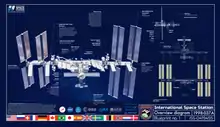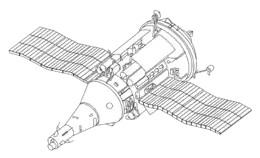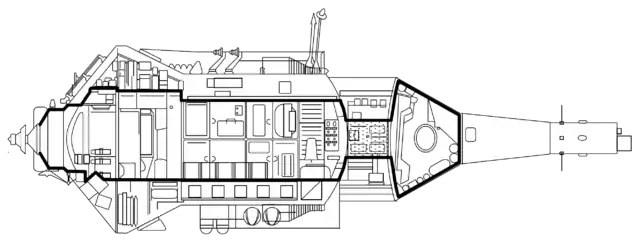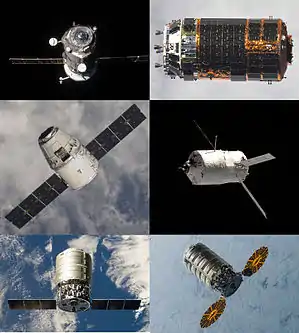Nauka (ISS module)
Nauka (Russian: Нау́ка; lit. Science), also known as the Multipurpose Laboratory Module (MLM), (Russian: Многофункциональный лабораторный модуль, or МЛМ), is a component of the International Space Station (ISS) which has not yet been launched into space. The MLM is funded by the Roscosmos. In the original ISS plans, Nauka was to use the location of the Docking and Stowage Module. Later, the DSM was replaced by the Rassvet module and it was moved to Zarya's nadir port. Planners anticipate Nauka will dock at Zvezda's nadir port, replacing Pirs.[1][2]
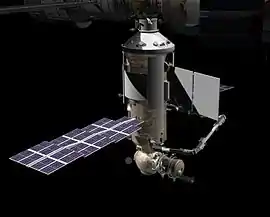
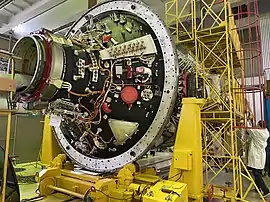
The launch of Nauka, initially planned for 2007, has been repeatedly delayed for various reasons. In May 2020, Nauka was reported to be planned for launch in the second quarter of 2021,[3] after which the warranties of some of Nauka's systems will expire. In October 2020, Nauka was reported to be planned for launch in May 2021.[4]
Original plans for Nauka
In the 1990s, plans for the Russian Orbital Segment (ROS) of the ISS included several research modules that were intended to be adjacent to Zarya and Zvezda. In these earlier plans, the now-canceled complex of the Universal Docking Module (UDM) and the two newly developed Russian Research Modules were to be attached to Zvezda's nadir port – the UDM was to be based on the Functional Cargo Block FGB-2. The FGB-2 was originally built as a backup for the original launch of the Zarya (FGB) module – FGB-2's construction had been halted at 70% completeness in the late 1990s.[5]
However, the plans changed in the early 2000s. In August 2004, it was decided to build the Nauka ISS module based on the FGB-2.[6] During that time, there was an alternate rejected as a proposal for Nauka from RKK Energia, based on the canceled Commercial Enterprise Module (Entertainment and Studio Module), which was to be jointly funded by RKK Energia and SPACEHAB.[7]
Work on Nauka and launch date
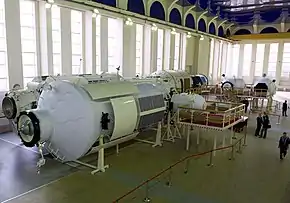
At the end of 2005, the European Space Agency (ESA) agreed with the Russians that the European Robotic Arm would be launched together with Nauka, mated on its surface for a later deployment in space. A spare elbow joint for the European Robotic Arm was already launched together with Rassvet.
In 2004, the Roscosmos stated that Nauka should be ready for launch in 2007 on a Russian Proton rocket. However, the Nauka project was delayed further, first to 2008 and later to 2009. In November 2006, an ESA bulletin mentioned that the Roscosmos was negotiating with the ISS partners to push back the prospective launch date to the end of 2008. In October 2011, it was reported that Nauka was expected to be launched at the end of 2013.[8] In May 2012, it was reported that the launch date had been pushed back to 2014.[9] The next planned launch date was April 2014, according to Vitaly Lopota, president of RKK Energia.[10]
On 25 October 2013, Parabolic Arc reported that Nauka was flawed and had failed acceptance testing at RKK Energia.[11] Found problems in the propulsion system included a leaking fueling valve that needed to be replaced and contamination, which would require a lengthy cleaning.[12] The module was to be returned to Khrunichev for repairs which would take another 12 to 18 months.[11] On 27 November 2013, it was reported that Roscosmos had informed NASA that the launch had been postponed until at least 2015.[13]
In April 2014, it emerged that the target date for launch was postponed to February 2017: a new propulsion system needed to be manufactured, as the installed system had exceeded its warranty.[12] The leaking fuel valve had also damaged the module's exterior plumbing, necessitating the replacement of most of the plumbing.[14]
By November 2016, the tentative launch date had slipped to mid-2018.[15] aboard a Proton-M rocket. In December 2017, it then slipped further with a projected launch date of March 2019, before a 20 December 2018 launch date was confirmed.[16]
In August 2018, Roscosmos head Dmitry Rogozin set a new launch date of November 2019.[17] However, the propellant tanks were found to be contaminated with metallic dust in 2017, requiring repair and replacement work; a tentative new launch date in June 2020 was not met because the repair of the fuel tanks was initially unsuccessful; NPO Lavochkin was slated to produce new single-use fuel tanks based on the Fregat upper stage.[14] Production of this new fuel system, installation into Nauka (at NPO Energia), and additional testing would delay the launch to after 2020.[18]
On 17 October 2019, TASS released information about the successful repair of the original tanks, so Fregat-based tanks were not needed anymore. The launch date of Nauka in November 2019 was confirmed.[19] On 14 November 2019, the Russians informed the European Space Agency (ESA) that the launch of Nauka would be postponed again for at least three months. A launch date in 2021 means further work on certifying aging equipment.
On 23 January 2020, TASS reported that the roll out was postponed until the end of March 2020 to replace valves on Nauka's fuel tanks.[20] On 4 February 2020, Dmitry Rogozin said Nauka required more testing because the warranty had expired and testing could only be done in Moscow instead of Kazakhstan delaying launch to January 2021. Testing is ongoing and should be completed by May 2020.[21] On 21 February 2020, the construction of the Proton rocket was completed and the stages were shipped to Baikonur.[22] On 2 April 2020, TASS reported that repairs to the valves were complete but the module's systems had yet to be tested before shipment to Baikonur, which would move the roll out to the end of May 2020. Due to concerns over the novel coronavirus, work has been suspended until 15 April 2020, but systems testing will be performed by a skeleton crew until work resumes.[23]
Despite the coronavirus, work never stopped despite the delay and a limited workforce. Nauka was shipped to Energia on time for vacuum testing which will take a month. Roll out was scheduled for the last week of June or the first week of July. Nauka faced another coronavirus delay in July and work resumed on 31 July 2020. Nauka was shipped out on 10 August 2020 and is expected to arrive at Baikonur in the coming weeks.[24][25] On 19 August 2020, the train carrying Nauka arrived at Baikonur and the module was unloaded for the rail car and taken to Site 254. Work involved installing the new tanks, installing the European Robotic Arm, installing the solar arrays and radiators, and placing Nauka into its payload fairing before the module is rolled over to the booster assembly facility and attached to the Proton rocket which will take it to space.[5][26]
On the morning of 21 August 2020, Nauka was delivered to the assembly and testing facility at Site 254 and removed from its shipping container. A crane then set it down on cradles and rolled the module into hard cell 5 where the contamination covers over the active Common Berthing Mechanism (CBM) were removed. On 11 September 2020, workers next installed a decontamination airlock and the hatch was opened so workers can take the shipping panels out to load the cargo and the launch restraints. Outside the micrometeoroid and orbital debris armor was installed over the new tanks and the solar arrays and batteries installed. Over at the airport Antonov delivered the adapter ring which will be bolted to the aft end before the module is attached to the Proton. Fit checks with Prichal will be done before the module is placed in the fairing and delivered to Site 200 and attached to the Proton rocket.[27][28]
On 10 October 2020, Expedition 65 cosmonauts Oleg Novitsky and Pyotr Dubrov conducted the first part of the Crew Equipment Interface Test in preparation for their mission and Nauka's move to final assembly. The cosmonauts inspected systems and made their recommendations before they toured the outside of the module to locate the fittings they will attach their equipment to when the module arrives at the station next year.[29]
Oleg Novitsky and Pyotr Dubrov returned to Baikonur on 2 November 2020 for the second part of the Crew Equipment Interface Test. Hatches were opened, antennas were deployed, and Nauka was powered on for the first time. On 3 November 2020, Nauka was put through a series of tests to make sure the systems that power it work when the module is in free flight before it docks to the ISS next year. To date, 306 tests have been completed of the 754 needed before Nauka can be transported to Site 200 for launch processing.[30][31]
On 16 January 2021 Roscosmos reported Nauka has reached 80% complete. During the month of January teams at Baikonur have installed all the systems and tested the tanks and thrusters to flight level. On 15 January 2021 all docking hatches have been installed and the last of the MMOD armor and the radiators have been placed on the hull. In a nearby hanger the solar arrays and the European Arm are undergoing final testing before they are installed at the end of February.[32][33]
The launch date was scheduled for May 2021 but because of issues with testing and new restrictions because of the coronavirus that delayed processing and ISS crew schedules Dmitry Rogozin scrubbed the launch until July 2021 pending a new launch schedule and better ballistic conditions.[4][34]
Usage
Nauka will initially be used for experiments, docking and cargo. It will also serve as a crew work and rest area. Nauka will be equipped with full guidance and navigation control including engines and an attitude control system that can be used as a backup by the ISS. It will be docked onto the Zvezda module's nadir (Earth facing) docking port. Outfitting equipment launched in 2010 with the Rassvet (Mini-Research Module 1) on NASA's STS-132 will also be used for Nauka, the spare elbow joint for the European Robotic Arm (launched with Nauka), internal hardware and an experimental airlock will be positioned on one of the side-facing ports at the bottom of the module. The new module will contain crew quarters with life support equipment including atmospheric processing, galley and toilet.[8][35]
After launch, the Nauka module will dock with the nadir, or Earth-facing, port of the space station's Russian Zvezda service module. That location has been occupied by the Russian Pirs docking compartment since 2001. The Pirs module will be discarded before Nauka's arrival using a departing Russian Progress cargo freighter, which will guide itself back into Earth's atmosphere to burn up on re-entry with the Pirs compartment.[1]
.jpg.webp)
Primary research module
Nauka will be Russia's primary ISS research module. For some time, NASA's official plans included a second research module around the same size as Nauka, listed to be "under review", but it was eventually canceled, leaving Nauka to be the only Russian research module besides Rassvet and Poisk (Mini-Research Module 2).[1][5]
Specifications
- Length: 13 m (43 ft)
- Diameter: 4.11 m (13.5 ft)
- Mass: 20,300 kg (44,800 lb)
- Materials: stainless steel, aluminum alloy, kevlar and ceramic-wool insulation
See also
- Scientific research on the ISS
- Russian Orbital Segment
References
- Clark, Stephen (25 August 2020). "Russia's long-delayed space station research module arrives at launch base". Spaceflight Now. Retrieved 26 August 2020.
- Morring, Frank (23 May 2012). "Russia Sees Moon Base As Logical Next Step". Aviation Week. Archived from the original on 12 November 2012. Retrieved 29 May 2012.
- ""Роскосмос" сообщил дату запуска следующего российского модуля на МКС" [Roscosmos announces the launch date of the next Russian module on the ISS] (in Russian). RIA Novosti. 23 May 2020. Retrieved 3 June 2020.
- "ISS turns 20" (PDF). Aviation Week and Space Technology (AWST). 26 October 2020. Retrieved 30 October 2020.
- Atkinson, Ian (19 August 2020). "Russia's Nauka Arrives Baikonur for final launch preparations". NASASpaceflight. Retrieved 20 August 2020.
- "02.26.97.iss.memo". nasawatch.com. 1997. Retrieved 10 July 2008.
- Zak, Anatoly (20 November 1998). "Russian segment of the ISS". RussianSpaceWeb. Retrieved 3 October 2009.
- Chernoivanova, Alina (19 October 2011). "Новые деньги под старую "Науку"" [New money for the old "Science"]. gazeta.ru (in Russian). Retrieved 1 February 2012.
- Morring, Frank (23 May 2012). "Russia Sees Moon Base As Logical Next Step". Aviation Week. Retrieved 29 May 2012.
- "О запусках новых российских модулей МКС" [About launches of new Russian modules to the ISS] (in Russian). 24 August 2013.
- "Роскосмос сообщил НАСА, что модуль МЛМ не войдет в состав МКС в 2014 г." [Roscosmos has informed NASA that the MLM module will not join ISS in 2014] (in Russian). RIA Novosti. 27 November 2013.
- "MLM (FGB-2) module of the ISS". RussianSpaceWeb.
- "Russia Postpones Space Lab Launch Again". RIA Novosti. 27 November 2013. Archived from the original on 13 April 2014. Retrieved 9 April 2014.
- Atkinson, Ian (3 July 2019). "Russia pressing forward on ISS expansion". NASASpaceFlight. Retrieved 5 July 2019.
- Karasev, Sergey (7 November 2016). "Запуск лабораторного модуля "Наука" к МКС откладывается" [Launch of the Nauka laboratory module to the ISS postponed] (in Russian). Retrieved 13 January 2017.
- Zak, Anatoly (22 March 2017). "This Russian ISS Module Has Been Delayed For a Decade and It's Still Not Ready to Fly". Popular Mechanics. Retrieved 20 August 2020.
- "Research module Nauka to be launched to ISS in November 2019". TASS. 16 August 2018. Retrieved 20 August 2018.
- "Источник: на модуль МКС "Наука" поставят баки от разгонного блока "Фрегат"" ["Source: tanks from the "Fregat" upper stage will be put on the ISS "Nauka" module"] (in Russian). TASS. 16 March 2019. Retrieved 17 March 2019.
- "Источник: модуль "Наука" планируют отправить на Байконур 15 января 2020 года" [Source: "Science" module is planned to be sent to Baikonur on 15 January 2020]. tass.ru (in Russian). TASS. 17 October 2019. Retrieved 17 October 2019.
- "Отправку модуля "Наука" на Байконур перенесли на март из-за работ с топливными баками" ["Sending the Science module to Baikonur was postponed to March due to work with fuel tanks"] (in Russian). TASS. 23 January 2020. Retrieved 29 January 2020.
- "Launch of Nauka module in November hardly possible, says Roscosmos chief". TASS. Retrieved 3 April 2020.
- "Russia's Proton-M rocket ready to deliver Nauka research lab to space station". TASS. Retrieved 3 April 2020.
- "Russia postpones launch of Nauka research module to orbital outpost to 2021". TASS. Retrieved 3 April 2020.
- "Nauka ISS module sent off to Baikonur". en.roscosmos.ru. Roscosmos. 10 August 2020. Retrieved 17 August 2020.
- "Russia postpones dispatch of Nauka research module to Baikonur spaceport to August 10". TASS. Retrieved 17 August 2020.
- "S.P. Korolev RSC Energia - News - Nauka module is being installed at the workstation". www.energia.ru. Retrieved 30 December 2020.
- "Новости. На Байконуре продолжается подготовка модуля «Наука» к запуску" [Baikonur continues to prepare the "Science" module for launch]. roscosmos.ru. Retrieved 16 September 2020.
- "S.P. Korolev RSC Energia - News - Nauka module pre-launch processing is in good progress at Baikonur". www.energia.ru. Retrieved 30 December 2020.
- "Новости. Дублирующий экипаж МКС-64 провел занятие на модуле «Наука»" [ISS-64 backup crew conducted a lesson on the Nauka module]. roscosmos.ru. Retrieved 11 October 2020.
- "Новости. Продолжаются испытания модуля «Наука»" [Testing of the "Science" module continues]. www.roscosmos.ru. Retrieved 9 November 2020.
- "S.P. Korolev RSC Energia - News - Nauka module testing continues". www.energia.ru. Retrieved 30 December 2020.
- "Новости. На космодроме Байконур продолжаются испытания модуля «Наука»" [Testing of the "Science" module continues at the Baikonur cosmodrome]. www.roscosmos.ru. Retrieved 24 January 2021.
- "News. Nauka module testing continues at Baikonur Cosmodrome". en.roscosmos.ru. Retrieved 24 January 2021.
- "Launch Of Russias Nauka Module To Space Station Likely To Be Postponed - Flight Schedule". UrduPoint. Retrieved 30 December 2020.
- Aviation Week staff (5 November 2020). "Russia To Launch Two New Modules To ISS In 2021". Aviation Week. Retrieved 6 November 2020.
External links
| Wikimedia Commons has media related to Nauka module. |
- – Description of MLM
- (in Russian) – Photos of the incomplete FGB-2 at Khrunichev.ru
- Новости российского сегмента МКС (in Russian) – November 2004 article discussing plans for MLM
- MLM (FGB-2) module of the ISS – RussianSpaceWeb on the history of the module
- MLM (Nauka) – from Gunter's Space Page
